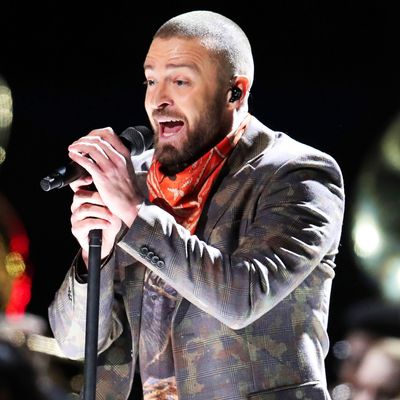
Like music’s other biggest night, over the past 25 years the Super Bowl halftime show has been a singular spectacle where scale, energy, and inoffensiveness are the central priorities. As with the big game that brackets it, the halftime show is incredibly costly and complexly orchestrated, but every effort is made to ensure that the permanent current of risk that animates football finds no counterpart in its halftime music.
The variety of acts that have found their way to the halftime stage span nearly every popular genre and audience. Latin singers and country singers and pop singers have performed. The Blues Brothers have performed alongside James Brown. A lot of rock bands have performed. Rappers are nearly as rare as unicorns on the Super Bowl stage, but they too have made appearances: Kid Rock and Nelly, Nicki Minaj and M.I.A., Missy Elliott.
By and large, the best performances have belonged to R&B singers, especially Prince, whose 2007 solo show set a standard likely never to be surpassed. Music, at its highest pitch, is inherently dangerous, though not necessarily to the body; Prince, seeking no doubt to top Michael Jackson’s 1993 show, pushed his spirit, and that of his listeners, to the breaking point. Yet even this apex performance received a measure of criticism: a New York Daily News TV critic saw fit to call out Prince’s guitar pose, with its phallic overtones, for being “embarrassingly rude, crude, and unfortunately placed.”
Moral and aesthetic prudery are rarely far from the halftime show discourse, especially when black performers are involved in something more than entertainment. Beyoncé’s Black Lives Matter– and Black Panther–themed performance of “Formation” in 2016 was assailed by Rudy Giuliani as dishonoring policemen. The most severe prudery, of course, came in response to Justin Timberlake’s inadvertent baring of Janet Jackson’s nipple in 2004. Jackson was not only criticized, but her ensuing albums were subjected to industry blacklisting and audience boycotts. Timberlake, meanwhile, evaded all but the most fleeting shame and sanction: His progress continued unhindered, and his superstar status was never eclipsed. A five-year hiatus leading up to an underwhelming, awkward album last week proved no obstacle to Timberlake’s landing a coveted solo performance at last night’s Super Bowl halftime show.
Technically speaking, Timberlake’s set was a testament to precision; the artist phased through songs and backdrops with the practiced ease of a man who, having spent over two decades dancing and singing at a high level in front of large crowds, could treat a Super Bowl–scale crowd and TV audience with all the casual relish normal people reserve for naps. If the halftime show was a school exam, he had aced it almost without having to study. Much like Bruno Mars, Timberlake’s physical aptitude and talent for arrangement have few rivals. The show often took on the semblance of an ensemble act, with the presence of battalions of backup dancers (a black dancer was nearly always carefully positioned close to the artist, as if to preempt the usual racial criticism directed at him) rendering a vaguely military cast to the entire affair. Timberlake is content to let his body and voice serve as a substitute for individual sensibility. Few artists of his stature have shown more physically or displayed less character in their music.
Yet unlike Mars, Timberlake is something less than a total exhibitionist at heart. One often suspects that he has a personality but simply doesn’t wish to expose it to criticism by a mass audience. There’s an evasive, even escapist tendency in his art; even his ambition stops short of presenting itself openly, though it often overreaches (literally, in the case of Nipplegate) nonetheless. He’s a star but not a legend, and the difference is especially acute whenever risk is involved. An icon would never have abandoned Janet Jackson to the wolves, nor floated the possibility of performing alongside a hologram of Prince against the direct wishes of the late artist only to back down when challenged on it.
Even as a two-dimensional cameo instead of a hologram, Prince’s image at the halftime show achieved what Timberlake’s entire set could not: It conveyed a spirit of personal distinction and pride. Prince in his purples looked as if he could never die; with his middle-aged beard and midlife-crisis outfit, Timberlake looked like he had never lived. One of the reasons Prince’s own halftime performance is unlikely to be bested is that Prince was a genius, and genius invites precisely the kind of controversy that the powers who run the halftime show are allergic to. Ultimately, Timberlake was there because he shared their instincts, not Prince’s, and that was what made his show, for all its crisp execution and costly bells and whistles, feel hollow, inessential.
He wasn’t even the second-best artist playing at the Super Bowl; Meek Mill, the unjustly incarcerated Philly rapper whose “Dreams and Nightmares” had become the Eagles’ unofficial anthem, upstaged him without showing up. Played as the Eagles emerged onto the field as well as in the victorious postgame locker room, Meek’s passionate signature song, it was clear, weighed more than Timberlake’s entire discography. Like Timberlake’s halftime set, “Dreams and Nightmares” is carefully structured as an escalation, but its gain in scale and volume is matched by a surge in passion, a will to justify one’s pride in the teeth of all skeptics and haters. It had everything that Justin Timberlake took pains to avoid, and is ten minutes shorter than his halftime set to boot. Only the incurably resentful would begrudge Timberlake his talents and advantages, but only the hopelessly complacent can keep from wishing that he’d done more with those prodigious gifts besides coasting in and out of popularity without ever saying anything substantial. He’s a frustrating artist, and not because the luxury of being a star who gets everything without saying anything is most available to white men. It’s because such a luxury is one that no great musician, of any background, has ever been able to afford.




